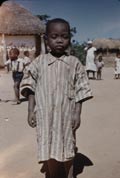“Rescue…”

Dear Deolinda,
 1961 was a significant year for you, Deolinda. But you were not alone in having serious misgivings for the future as you received reports about revolt and turmoil back home in Angola while you were here studying in the U.S.
1961 was a significant year for you, Deolinda. But you were not alone in having serious misgivings for the future as you received reports about revolt and turmoil back home in Angola while you were here studying in the U.S.
Others affected by the news from home were 86 of your fellow Angola students who happened to be in Portugal at the time the conflicts were escalating. Like you, those university-trained potential leaders, aspiring to freedom from long years under the Portuguese regime, were suspect. After hostilities broke out back in Angola, Salazar authorities took away the students’ passports. For them, uncertainties abounded.
This is a story that I’ve recently listened to again, Deolinda--a recording of the words of Dave Pomeroy and other New York Union Theological seminarians who just happened to be in Europe that summer of 1961. They were called upon to be part of a rescue team to get the students out of Portugal, across the border into Spain and across yet another border to safety in France.
In 1968, those seminarians got together and relived the memories of those adventures, creating a permanent record of what happened during those intense days. They admitted that at the time they set out it seemed like a glamorous and almost romanticized assignment. By the time it was over, they had faced the stark realities of the risks they were taking, along with the staggering implications for the students who somehow had been smuggled to hideouts near the border awaiting pickup by their rescuers.
I first heard the recordings when I met Dave Pomeroy at the time we both served on the National Council of Churches Friendship Press board, producing materials for use as mission studies for various denominations of the NCC. Knowing of my short-term missionary experience in Angola, Dave loaned me the recordings because he knew how much I had been affected by the experience there.
Later, I loaned them to Melvin Blake at an Angola reunion. You knew Melvin and his family when they served as full-time missionaries in Angola during the time I was there on my three-year assignment. Sometime before 1961, he took a job at the Board of Missions in New York, and moved the family back to the U.S. At the Board, he had the responsibility of supervising the Methodist Church’s missionary outreach in Africa and Europe. Along with authorities of the World Council of Churches, he made the fateful decision to engage Dave and his colleagues as part of a huge effort to smuggle the students out of Portugal.
At the reunion, Melvin sat up half the night listening to the cassette tapes. He had given the orders for the rescue, and knew the outcome, but until he heard Dave and the others relive the memories on those tapes, he didn’t know the full story of what had happened.
The tale began with the seminarians talking about the serendipity of being in Europe for a work camp sponsored by the WCC, when the word went out of an urgent need to locate drivers to smuggle Angolan students from Portugal to France. They speculated it would take one trip.
The young men signed up for the job; it turned out to be a real test of their courage. After an overnight train ride, they rented four cars and began driving south from Paris. They rendezvoused with others who were part of the top-secret team in San Sebastian, Spain. A local minister was prepared to house the students, once they reached that far on the freedom ride. They met with professional Spanish smugglers, and went to a farm owned by a cousin of one of the smugglers, where the students would be hidden at yet another locale. They checked out inspection points at border crossings.
What a saga! They ended up doing three round trips totaling 5,780 kilometers. Driving through the countryside, they commented about what a pastoral scene it was, even though they felt like fugitives. When they were too exhausted to drive any more, they slept behind the steering wheels, sheltering their cars in the woods out of sight of the road. At a strategic time, someone arrived by canoe late at night with a note and instructions about connecting with the students.
At this point in the narration, the names of some of the students were read. Because they didn’t speak Portuguese, the pronunciation was not very good, but, Deolinda, you would have known them all. One name stood out to me: Job de Carvalho. His flight from Portugal was followed by more close calls with danger, as he and eight other jovens safely arrived in New York City some years later. It was there they gathered to record “Voices in the Dark,” singing once again the beloved songs that are so deeply engrained in your African souls.
The Angolans were frightened, as you can imagine. The stakes were high for them, and they weren’t sure they could trust these unknown drivers. Because of language barriers, they couldn’t communicate very well with one another. The seminarians wanted to reassure them, using limited and somewhat theological language about being strangers together in a strange land. You know that story very well, Deolinda, in your own narration of traveling through the jungle with your companions, a journey eventually leading to your death.
